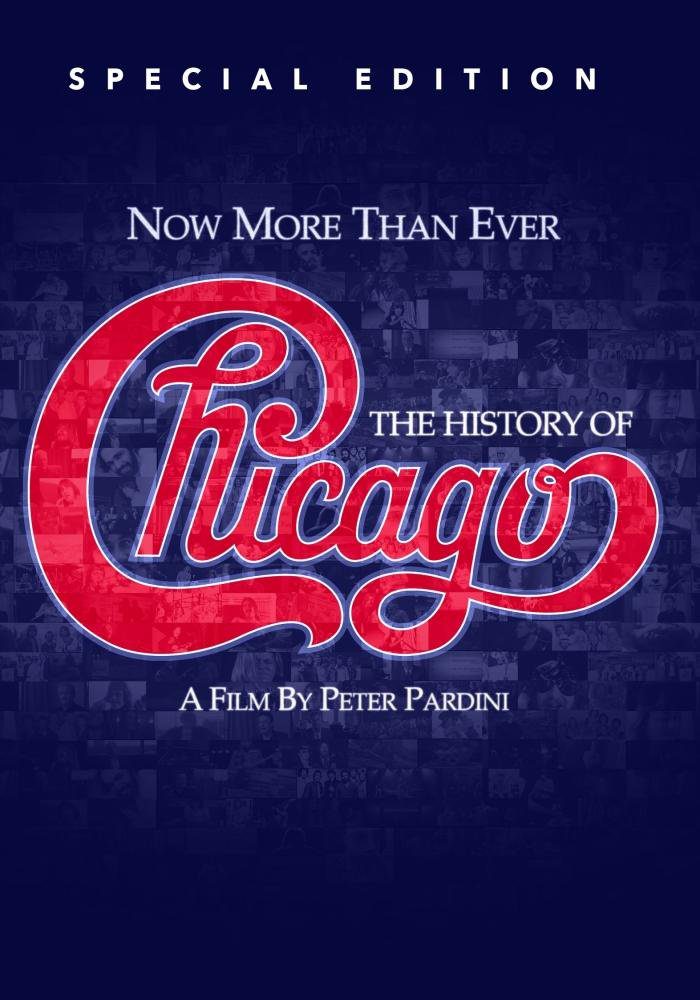
When asked to define Chicago’s sound, saxophonist Walter Parazaider provides this simple summary: “a good rock and roll band with horns.”
The band has accomplished that goal in their 50-year-career, from their origins at Chicago’s DePaul University to their ’70s heyday through their controversial 1980s productions with David Foster. The documentary Now More Than Ever: The History of Chicago aims to chronicle their story, told through interviews with current members as well as rare home video footage. While it’s an interesting portrait of the band’s tangled history, it is also a one-sided perspective missing some key voices.
Director Peter Pardini forgoes narration to let founding members Robert Lamm (keyboards), Lee Loughnane (trumpet, flugelhorn), James Pankow (trombone, horn arranger), and Parazider detail the early years. Former drummer Danny Seraphine also describes his time with the band, although he was dismissed from the group in 1990. One figure that looms prominently throughout the film is guitarist/vocalist Terry Kath, another founding member of Chicago who met Loughnane, Parazaider, Saraphine, and Pankow when they were students at DePaul in 1967. Lamm and Peter Cetera later joined the group, the latter playing bass and providing vocals. The band appeared in local clubs but earned a reputation for being difficult; they wanted to play their own compositions, while most club owners wanted bands to perform covers of well-known songs. Actor (and native Chicagoan) Joe Mantegna, who performed in a band who worked the same circuit as Chicago, humorously recalls how no one could understand why they insisted on playing primarily original compositions.
A year later the bandmates relocated to Los Angeles, changed their name to “Chicago Transit Authority,” and appeared regularly at the famed Whisky a Go Go. They opened for Janis Joplin there, learning about stage presence from the singer. In addition, CTA became friendly with Jimi Hendrix; he reportedly admired their horn section and Kath’s guitar work. Columbia Records’ then-president Clive Davis signed them to his label, and the group’s first studio recording was the classic “Beginnings,” made distinctive by Kath’s memorable acoustic guitar. The subsequent album, Chicago Transit Authority, hit the Billboard top 20 and spawned several hit singles such as “Questions 67 and 68” and “Does Anybody Really Know What Time It Is?”
The year 1970 brought changes: the band shortened their name to “Chicago” to avoid being sued by the real Chicago Transit Authority, and they released an ambitious self-titled album. Pankow composed a thirteen-minute suite entitled “Ballet for a Girl in Buchannon,” which yielded the massive hits “Make Me Smile” and “Colour My World.” Both featured Kath on lead vocals; Pankow said his Ray Charles-like singing style added deep emotion and soul to both.
Each year brought more success, but also temptation; throughout the documentary, the original members speak frankly about their drug use. Their hedonistic lifestyle greatly increased in 1973, when they began recording in a private studio owned by their manager James William Guercio. Because of its remote Colorado location, Chicago began partying harder than ever; nevertheless, they managed to continue releasing critical and commercial hits such as Chicago VI and the singles “Just You ‘n’ Me” and “Feelin’ Stronger Every Day.” Cetera also emerged as a powerful force, writing ballads that other band members disliked but became huge successes.
Interviews reveal how Chicago suffered two losses in 1978. They split with manager Guercio, after they believed he overly profited from their sales. Next came an event that would forever shape the group: Kath’s accidental death from a self-inflicted gunshot. As Loughnane and others tearfully recall, the band never recovered from Kath’s death—it altered their sound and, for a time, left them rudderless.
After a sales slump in the late 1970s, Chicago changed labels and relaunched their career with the help of producer Foster. Now More Than Ever hits its stride in this section, as it provides an often tense recounting of their commercially successful—but critically disastrous—period. Cetera struck up a close working relationship with Foster, leading them to cowrite songs that, as one band member put it, “became a Peter Cetera album, not Chicago.” While Foster admits that he may have overly softened their sound (virtually eliminating Chicago’s trademark horns), he defended his work, pointing to their numerous hits. While “Hard Habit to Break” and “You’re the Inspiration” remain adult-contemporary staples, they led to Cetera’s departure and a critical drubbing for the band. Some argue that Chicago 17 and the single “Hard to Say I’m Sorry” prevented Chicago from being inducted into the Rock and Roll Hall of Fame until 2016.
The remainder of the documentary chronicles of Chicago’s later years, scoring hits such as “Look Away” before easing into “classic rock band” status. Today they still tour, albeit with some new members. While the film ends on a positive note, the band members express some trepidation as to how much longer they will tour—and, when they retire, how close they will remain.
While Now More Than Ever: The History of Chicago features rare home-video footage and honest depictions of how Chicago fell into the hedonistic 1970s “sex, drugs, and rock and roll” trap, the film feels one-sided. Chicago themselves are listed as producers of the movie, possibly resulting in the story being “whitewashed.” In addition, key figures such as Cetera, 1980s band member Bill Champlin, and manager Guercio refused to be interviewed; thus the story lacks their apparently dissenting voices. Audiences hear only Loughnane, Parazaider, Saraphine, Lamm, and Pankow’s perspectives, but one senses there are multiple sides to the story. Occasionally, director Pardini uses heavy-handed instrumental background music and constant images of sand running through an hourglass; both cliches lend nothing to the narrative.
Casual and longtime fans alike will find Now More Than Ever: The History of Chicago interesting in some places, but it feels like a one-dimensional portrait. Hearing all voices, even disgruntled ones, would have painted a full picture of an influential and essential band.